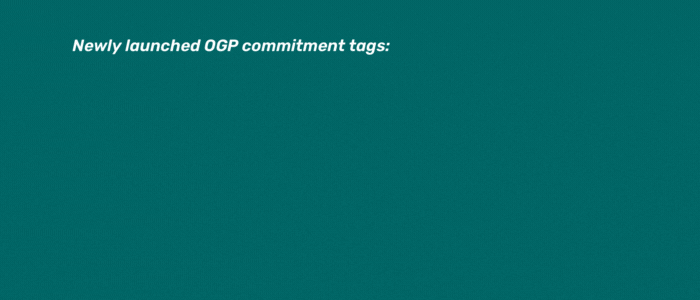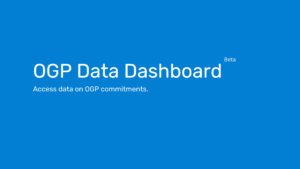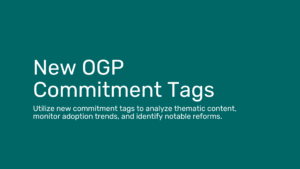Aligning OGP Commitment Analysis with the Open Gov Challenge
OGP action plans feature commitments spanning various policy areas like anti-corruption, climate, justiceTo address barriers that prevent citizens from having their justice needs met, OGP participating governments are working to expand transparency, accountability, and inclusion into all systems of justi..., and civic space. The OGP Support UnitThe OGP Support Unit is a small, permanent group of staff that work closely with the Steering Committee and the Independent Reporting Mechanism to advance the goals of the Open Government Partnership.... categorizes these reforms using commitmentOGP commitments are promises for reform co-created by governments and civil society and submitted as part of an action plan. Commitments typically include a description of the problem, concrete action... tags, enabling the community to analyze thematic content, monitor adoption trends, and identify notable reforms. Today, the OGP Support Unit is updating its tags to include 13 new commitment areas that better capture the work of its members.
These new tags align OGP data with the recently launched Open Gov Challenge, enabling the open government community to track progress in the featured Challenge areas. Here is a look at some analysis made possible by the new commitment tags and resources to further explore commitments across these policy areas.

BOX: Newly launched OGP commitment tags
|
|
Anti-Corruption Strategies
Whole-of-government anti-corruption strategies prioritize greater government transparencyAccording to OGP’s Articles of Governance, transparency occurs when “government-held information (including on activities and decisions) is open, comprehensive, timely, freely available to the pub... More and accountability across policy areas and sectors. The Open Gov Challenge encourages OGP members to develop and strengthen anti-corruption strategies, ensuring strong policies in areas like beneficial ownershipDisclosing beneficial owners — those who ultimately control or profit from a business — is essential for combating corruption, stemming illicit financial flows, and fighting tax evasion. Technical... More, lobbyingLobbying transparency allows the public to ensure that there is diversity of participation and contribution to public decision-making. Technical specifications: Policies and actions affecting lobbying..., and political finance.
Members are increasingly prioritizing the creation and implementation of anti-corruption strategies in their OGP action plans. Currently, 11 OGP members are implementing a commitment related to these strategies. These include:
- Croatia’s commitment to adopting an action plan to combat corruption over the next three years, implementing their 2021-2030 Anti-Corruption Strategy (2022)
- The United States’ commitment to implementing their Strategy on Countering Corruption, which includes reforms to combat illicit finance (2022)
Mainstreaming Participation
Embedding public participationGiving citizens opportunities to provide input into government decision-making leads to more effective governance, improved public service delivery, and more equitable outcomes. Technical specificatio... practices across government institutions is a core objective of open government and a key focus area in the ongoing Open Gov Challenge.
Over half of OGP countries with an active action planAction plans are at the core of a government’s participation in OGP. They are the product of a co-creation process in which government and civil society jointly develop commitments to open governmen... are implementing a commitment to mainstream participation, with particularly high commitment adoption rates among European countries. Institutionalizing participation opportunities is also popular at the local level. 16 OGP Local members are currently implementing a commitment in this area. Examples include:
- Côte d’Ivoire’s commitment to institutionalizing participatory budgeting at the local level (2022)
- Moldova’s commitment to improving public consultation mechanisms in decision-making (2023)
- Contagem, Brazil’s commitment to developing an online platform for citizen participation (2022)
Gender-Based Violence
Since 2011, OGP members have made over 200 commitments involving gender-related reforms. In recent years, a growing subset of these commitments have focused on tackling gender-based violence. OGP is further encouraging gender-based violence reforms through the Open Gov Challenge.
Sierra Leone made the first OGP commitment to reduce gender-based violence in 2016. Since then, 18 OGP members, including 16 countries and 2 local jurisdictions, have made a total of 27 commitments on combating gender-based violence. These include:
- Ecuador’s commitment to co-create their 2019-2025 National Plan to Prevent and Eradicate Violence Against Women (2019)
- North Macedonia’s commitment to improving access to justice for victims of domestic violence (2021)
- Guatemala’s commitment to strengthen institutional processes for the prevention of violence against women (2023)
International Environmental Agreements
Many countries use their OGP action plans as a vehicle for advancing commitments made through international agreements or at global summits. The Open Gov Challenge encourages the use of open government approaches to strengthen international environmental agreements, such as the Escazú Agreement, Aarhus Convention, and Paris Agreement.
In total, 19 OGP members have made 29 commitments that reference environmental agreements. Countries from Latin America and the Caribbean made a majority of these commitments, following the signing of the Escazú Agreement in 2018. Examples include:
- Ireland’s commitment to providing access to environmental information under the Aarhus Convention (2014)
- Ecuador’s commitment to implementing the Escazú Agreement by improving access to environmental information, public participation in environmental decision-making, and access to justice in environmental matters (2019)
- Chile’s commitment to developing a Participatory Implementation Plan of the Escazú Agreement (2023)
Explore OGP commitment data
More insights from these new commitment tags can be found in OGP’s databases and data tools. OGP commitment data is accessible to the public in open format and through interactive visualizations. The following resources are available for the OGP community:
- OGP public commitment database: The OGP public commitment database includes daily updated data on the content and performance of all OGP commitments since 2011. This information is derived from OGP action plans and reporting from the Independent Reporting Mechanism (IRM)The Independent Reporting Mechanism (IRM) is OGP’s accountability arm and the main means of tracking progress in participating countries. The IRM provides independent, evidence-based, and objective ....
- OGP Data Dashboard: The OGP Data Dashboard is a one-stop-shop for accessing data on OGP commitments. Explore commitments and visualize trends by policy area, location, and year. New policy areas featured on the Data Dashboard include elections, political finance, mainstreaming participation, gender-based violence, climate mitigation and adaptation, and international environmental agreements.
- OGP Glossary: The OGP Glossary serves as a single, definitive source of definitions for OGP-related terms, including IRM terminology, OGP process standards, and open government policy areas. Learn how each of the 13 new tags are defined by the OGP Support Unit in the “Policy Areas” section.
If you have any questions, comments, or insights to share after exploring data from the new commitment tags, feel free to reach out to [email protected].
No comments yet
Related Content
 OGP News
OGP News
Launching the OGP Data Dashboard
Introducing the OGP Data Dashboard - a powerful tool for unlocking evidence and examples in data.
 Challenges and Solutions
Challenges and Solutions
OGP data services and three things to expect in 2024

The Open Gov Challenge
Join hundreds of reformers around the world - in government and civil society - who are working to make their communities stronger, more open, participatory, inclusive, and accountable.


Leave a Reply